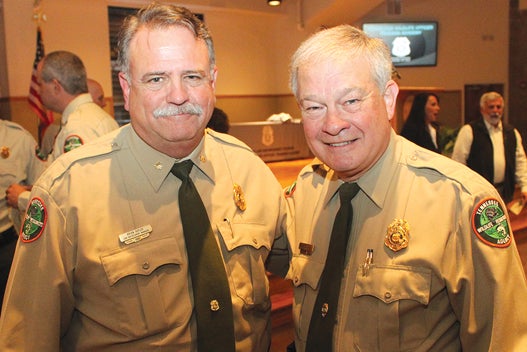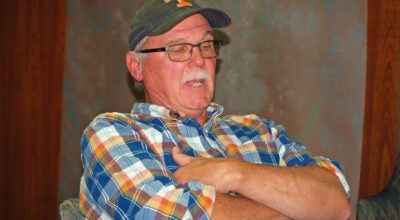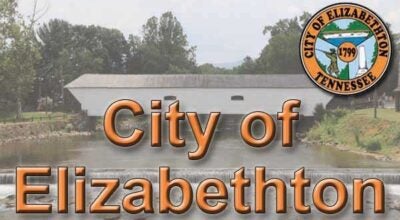TWRA Region 4 Major Brian Ripley is retiring
Published 8:15 am Tuesday, December 24, 2019

- WRA Region 4 Major Brian Ripley (left) with Executive Director Ed Carter at the 2019 Tennessee Wildlife Officer Training Academy new officer graduation ceremony.
TWRA Region 4 Major Brian Ripley is retiring after more than thirty-seven years of service to the hunters, anglers, boaters and wildlife of the State of Tennessee. A retirement luncheon was held at the TWRA Regional Office recently as friends, family and colleagues gathered to celebrate his storied career. TWRA Executive Director Ed Carter, as well as present and past Tennessee Fish and Wildlife Commissioners, also recognized Brian at the commission meeting held in Gatlinburg.
Brian began his natural resources career in 1980 with the U.S. Fish and Wildlife Service, Department of Interior as a member of the Young Adult Conservation Corps (YCC). He was first assigned as a fisheries technician working as a creel clerk and conducting stream surveys with the Snail Darter Recovery Team. After graduation from The University of Tennessee Knoxville in 1982, he began his 37-plus year career with the Tennessee Wildlife Resources Agency as a Wildlife Technician, again working as a creel clerk on the Norris tailwater.
In 1984, Brian promoted to the position of Wildlife Officer serving in Carter, Grainger, and Knox Counties. In 1986, he began serving as Area Representative to the Tennessee Wildlife Protection Association (TWPA) and later served as Secretary/Treasurer through 1990. During this period the TWPA changed its name to the association’s current moniker: Tennessee Wildlife Officers Association (TWOA). In 1989, Brian was promoted to the position of Assistant Area Supervisor in Area 41, and served in that capacity until his promotion to Area 41 Supervisor in 2000, where he remained until the TWRA reorganization in 2010. As a result of the reorganization, Brian was named Law Enforcement Program Manager for Region IV and awarded the rank of Major, serving in this capacity until his retirement on December 30, 2019.
During Brian’s tenure, he has been involved in every big game restoration project including white-tailed deer, eastern wild turkey, and elk. He has seen the black bear population grow exponentially from a few hundred to an estimated 6,000 statewide. He was named as the Area 41 Wildlife Officer of the Year in 1989. He was instrumental in the first successful felony Lacey Act prosecution in the Eastern District of Tennessee, and received a unit commendation as a member of the TWRA Hurricane Katrina response team. Brian was involved with others in professionalizing the TWRA approach to recreational boat accident investigation and reconstruction, and was awarded a Lifetime membership in the International Association of Marine Investigators (IAMI) Inc., where he served as President in 2000 and 2001. He instructed law enforcement and insurance professionals both in the U.S. and abroad on recreational vessel identification, marine theft detection, fraudulent documents, and related marine crime. In addition, Brian has spoken internationally on such topics as accident investigation, marine theft, standardization of recreational vessel numbering and titling, and the importance of standardized training in general. He is a 2011 graduate of both the Tennessee Government Management Institute (TGMI), and well as the Tennessee Law Enforcement Executive Development Seminar (TLEEDS). Brian also served as the committee chair of the TWRA Leadership Development Study Committee in 2011.
When asked to reflect on his career, Brian said, “I came to work in the heyday of wildlife management and restoration; when wildlife agencies were truly coming into their own. I was fortunate to work for an agency in which both Directors I served under possessed vision, and always looked 30, 50, 100 years down the road. I got to do the things that I grew up watching on the old TV show Wild Kingdom; real hands on stuff. In the early years, I even prosecuted my own cases in General Session Court on many occasions. I got to see firsthand our boating safety efforts reach a professional standard that people expect and deserve and is known both around the country and world. I even got paid to run the Tennessee River from Knoxville to Paris Landing State Park twice. Up until nine years ago, I routinely spent many days doing things most people gladly invest thousands to do, and it was my job! How many people get to say that? Most importantly, I had the good fortune to work with some exceptional and dedicated individuals over the years; people that knew the job they performed had meaning and purpose, and I have learned something from almost all of them. All in all, it has been a great ride!”





